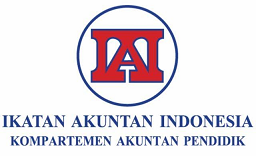PENGARUH KOMPENSASI DAN KEPUASAN KERJA TERHADAP KEINGINAN UNTUK PINDAH DARI PERUSAHAAN (Studi Kasus pada Dealer di Bandarlampung)
Abstract
Turnover can also be defined as the movement of workers out of the organization. Turnover refers to the final reality faced by an organization in the form of the number of employees who leave the organization in a certain period, while the desire of employees to move (turnover intentions) refers to the results of individual evaluations regarding the continuation of relationships with the organization that have not been manifested in definite actions to leave the organization. This study aims to determine the effect of Financial Compensation on Turnover Intention, Knowing the effect of Non-Financial Compensation on Turnover Intention and Knowing the effect of Job Satisfaction on Turnover Intention. In this study, sample selection was carried out using purposive sampling method. The purposive sampling method is a sampling technique with certain considerations. The sample in the study was selected using purposive sampling and obtained 65 samples. Based on the research results, financial compensation has no significant positive effect on the dependent variable, namely Turnover intention (Y), non-financial compensation has no effect on the dependent variable, namely Turnover intention (Y) and Job Satisfaction has no effect on the dependent variable, namely Turnover intention.
Downloads
References
Artiningrum, B., & Satrya, A. (2016). Analisis Pengaruh Career Management, Training Satisfaction, Pay Satisfaction Terhadap Turnover Intention dan Peran Mediasi Organizational Engagement Pada Karyawan Sektor Perbankan. Jurnal Manajemen Dan Bisnis Sriwijaya, 14(3), 337-352.
Asep Qustolani, 2016, Pengaruh Kompensasi Dan Keadilan Prosedural Terhadap Kepuasan Kerja Karyawan (Studi Kasus Pada PT Telekomunikasi Indonesia, Tbk Kabupaten Cirebon), Jurnal Ilmiah Manajemen & Akuntansi Vol. 3 Nomor 1 Tahun 2016
Bitha, S., & Ardana, I. K (2017). Pengaruh Keterikatan Kerja, Persepsi Dukungan Organisasional Dan Komitmen Organisasional Terhadap Turnover Intention Karyawan Muji Motor. E-Jurnal Manajemen Universitas Udayana, 6(2).
Davis, Keith and John W. Newstrom, 1994, Human Behavior at Work Organizational Behavior, Terjemahan : Agus Dharma, Jakarta: Erlangga.
Ghozali, Imam. 2013. Aplikasi Analisis Multivariate dengan Program IBM SPSS. 21 Update PLS Regresi. Semarang: Badan Penerbit Universitas. Diponegoro.
Hasibuan, Malayu. S.P. 2011. Manajemen Sumber Daya Manusia. Jakarta: Bumi Aksara
Harnoto. 2002.Manajemen Sumber Daya Manusia. PT. Prehallindo, Jakarta
Karatepe, O. M. (2013). High-performance work practices, work social support and their effects on job embeddedness and turnover intentions. International Journal of Contemporary Hospitality Management, 25(6), 903-921.
Keith, Davis, Jhon W. Newstrom, 1995. Perilaku Dalam Organisasi, Edisi Ketujuh, Erlangga, Jakarta. Mangkunegara, Anwar Prabu. 2009. Manajemen sumber daya manusia. Bandung: PT. Remaja Rosdakarya
Mohammad Nizar Al Qofiqi, Bambang Swasto Sunuharjo dan Ika Ruhana. 2
Pengaruh Kompensasi terhadap Kepuasan Kerja dan Intention to Leave (Studi pada Karyawan Bank Jatim Cabang Malang). Jurnal Administrasi Bisnis (JAB)|Vol. 36 No. 1 Juli 2016
Noe, Raymond A., et al. 2011. Manajemen Sumber Daya Manusia Buku 2 Edisi 6.
Jakarta: Salemba Empat. Rivai, V. dan E.J. Sagala. 2010. Manajemen Sumber Daya Manusia untuk Perusahaan: Dari Teori ke Praktik. Edisi 2. Jakarta: Rajawali Pers. Robbins dan Judge. 2008. Perilaku Organisasi. Edisi Kedua Belas. Buku 1. Jakarta: Salemba Empat.
Putri Rarasanti, I. A., & Suana, I. W (2016). Pengaruh Job Embeddedness, Kepuasan Kerja, Dan Komitmen Organisasional Terhadap Turnover Intention Karyawan. E-Jurnal Manajemen Universitas Udayana, 5(7).
Rivai, Veithzal. 2008. Manajemen Sumber Daya Manusia Untuk Perusahaan. PT Rajagrafindo Persada. Jakarta.
Robbins, Stephans. 1994. Organization Theory, Structure, Design and Application, Alih Bahasa Yusuf Udara, Arean, Jakarta.
Robbins, P. Stephen dan Mary Coulter. 2010. Manajemen, diterjemahkan oleh Bob Sabran, Wibi Hardani. Erlangga:Jakarta
Robbins, Stephen. P. 2007. Perilaku Organisasi. PT Indeks Kelompok GRAMEDIA. Jakarta.
Royan Zakaria & Isthofaina Astuty,2017,Pengaruh Kompensasi Terhadap Turnover Intention Dengan Job Embeddedness Sebagai Variabel Intervening (Studi PadaKaryawan Di PT. Primissima), Vol 8, No 1 Maret 2017
Rutoto, Sabar. 2007. Pengantar Metedologi Penelitian. FKIP: Universitas Muria Kudus
Sugiyono. 2011. Metode Penelitian Kuantitatif, Kualitatif, dan R&D. Bandung: AFABETA, cv.
Sari, Riski Agustina. 2012. Pengaruh Kompensasi, Lingkungan Kerja dan pengembangan Karir Terhadap Tingkat Turnover Pegawai PT. Bank Danamon Cabang Palembang. Jurnal Ilmiah Magister Manajemen Universitas Bina Darma Vol.x No. x, Agustus 2012:1-12
Sari, Rindi Nurlaila. 2014. Pengaruh Kepuasan Kerja, Stres Kerja dan Komitmen Organisasi Terhadap Turnover Intention (Pada Hotel Ibis Yogyakarta). Skripsi. Fakultas Ekonomi. Universitas Negeri Yogyakarta. Siagian, Sondang P. 2007. Manajemen Sumber Daya Manusia. Bumi A Jakarta.
Sugiyono. 2013. Metode Penelitian Bisnis. CV Alfabeta. Bandung.
Sugiyono. 2015. Metode Penelitian Kuantitatif Kualitatif dan R&D. Alfabeta. Bandung.
Wandy Zulkarnaen, dkk, 2018, Pengaruh Kompensasi Langsung Dan Kompensasi Tidak Langsung Terhadap Kinerja Karyawan Bagian Staff Operasional Pt Pranata Jaya Abadi Banjaran,Vol. 2 No. 2 Januari - Juni 2018.
Yang, C., Ma, Q., & Hu, L. (2011). Job embeddedness: a new perspective to predict voluntary turnover. Nankai Business Review International, 2(4), 418-446.
Zeffane, Rachid. 1994. Understanding Employee Turnover : The Need for a Contigency Approach. International Journal of Manpower. Vol 15. No 9. pp.1-14
Jurnal Akutansi dan Keuangan allows readers to read, download, copy, distribute, print, search, or link to the full texts of its articles and allow readers to use them for any other lawful purpose. The journal allows the author(s) to hold the copyright without restrictions. Finally, the journal allows the author(s) to retain publishing rights without restrictions
Authors are allowed to archive their submitted article in an open access repository
Authors are allowed to archive the final published article in an open access repository with an acknowledgment of its initial publication in this journal







